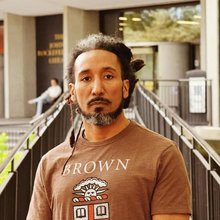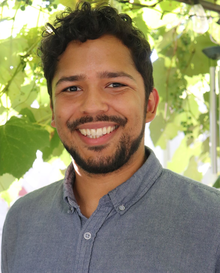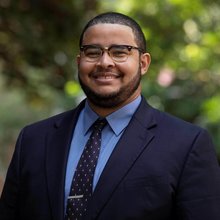CASBS Summer Institute on Diversity - 2024
Participants
Malik Boykin
Brown University

Dr. C. Malik Boykin is an Assistant Professor in the Department of Cognitive and Psychological Sciences at Brown University. Malik received his doctorate in Social and Personality Psychology from UC Berkeley, his M.A. in Social-Organizational Psychology from Teachers College, Columbia University, and his B.S. in Psychology from the University of Maryland University College (UMUC) – after first attending Howard University. Before his current faculty appointment, he was a Presidential Postdoctoral Fellow at Brown in the Department of CLPS. His research focuses on intergroup relations, hierarchy, systemic racism, and psychometric measurement. These themes inform his research on bias in decision-making algorithms. In collaboration with Machine Learning Engineer, Sarah Brown (URI), he has co-developed software to measure people’s preferences between fairness metrics to support a more equitable future for algorithmic decision systems. This platform serves to teach laypersons about algorithmic bias, and then assess their informed preferences for fair machine learning development. He has affiliate appointments with Brown University’s Center for the Study of Race and Ethnicity in America (CSREA) and the Data Science Institute (DSI).
Camellia Bryan
University of Toronto

Dr. Camellia Bryan, currently a Postdoctoral Fellow at the Rotman School of Management and the Gender and the Economy (GATE) Institute at the University of Toronto, will start as an Assistant Professor at the Sauder School of Business, University of British Columbia, in July 2024. Her research is concentrated on identifying the cognitive, emotional, and social dynamics that fuel resistance to diversity initiatives within organizations. Her Ph.D. from York University's Schulich School of Business explored these themes in depth, particularly through her dissertation titled Beyond Backlash: Reducing resistance and generating support in response to diversity initiatives through opening identity tactics. She is actively engaged in projects exploring identity shifts in Former White Nationalists and the dynamics behind shifts in support for DEI initiatives. A central theme in her work is the use of awakening events that capture attention and provoke reflection, aiming to challenge entrenched beliefs and encourage active engagement with diversity for a more inclusive society.
James Carter
Cornell University

James T. Carter is an assistant professor at the ILR School at Cornell University where he is a faculty affiliate with ILR WIDE (Workplace Inclusion and Diversity Education) and CAROW (Center for Applied Research on Work). His research broadly examines the psychological and contextual factors that pose barriers and offer pathways to improving diversity and inclusion in organizations. This work has been published in outlets such as Psychological Science, Organizational Behavior and Human Decision Processes, and the Journal of Business and Psychology. He holds a Ph.D. from Columbia Business School and a BA in Psychology (with honors) and English from Rice University with Distinctions in Research/Creative Works. Prior to academia, he held various positions in consulting, education, and human resources.
Lisa Covington
University of Arizona

Lisa Covington completed her Ph.D. at The University of Iowa studying the Sociology of Education with certificates in Digital Humanities and African American Studies. She has a Master’s in Women and Gender Studies from San Diego State University. During her time at the University of Iowa, Lisa earned eight prestigious fellowships. Recently, as an Inaugural Presidential Postdoctoral Fellow at the University of Arizona, Lisa has been awarded the 2024 Outstanding Postdoctoral Scholar Award and named a United Nations Delegate-Representative.
Lisa’s research explores the cartographies of Black girlhood across the elements of schooling, social movements and media. The latter examines the progression of Black girl characters to better understand the role of film and social institutions. In addition to Lisa’s many scholarly accomplishments, she also has a strong track record of applied scholarship and community engagement. Lisa has dedicated herself to bridging the gap between campus and has done so through founding two programs for students: the Ethnic Studies Leadership Academy and the Black Leadership College Program.
As a youth development professional and subject matter expert in racial inequities, diversity in film and social justice, Dr. Covington serves as a youth advocate and curriculum developer with youth of color, provides professional development on best practices for educators, coaches, media makers and community members to support the development of underrepresented youth in pre-school through college settings in California, Pennsylvania, Iowa, New Jersey, New York and Washington, D.C.
Dr. Covington serves on the board of the National Women's Studies Association, Black Lives Matter at School, National Urban League Young Professionals-Fund Development Committee. She looks forward to transitioning from postdoctoral scholar to assistant professor this fall.
Donghyun Danny Choi
Brown University

Donghyun Danny Choi is an assistant professor of political science at Brown University. As a political scientist specializing in identity politics and intergroup relations, he studies the challenges associated with governance and representation in diverse societies, with a special focus on how to better facilitate the inclusion of minoritized communities. His first (coauthored) book, Native Bias, examines how common norms and ideas can facilitate the inclusion of immigrants in democratic societies and was published by Princeton University Press in 2022. His other work has examined how trust towards co ethnics can be used to generate trust towards outgroup politicians and facilitate interethnic cooperation and whether different narrative strategies can persuade policymakers to increase support for the liberalization of abortion and extend social protections towards sexual minorities. He is currently working on a series of projects that investigate the legacies of institutionalized discrimination against Asian Americans in the United States. Danny was a pre/postdoctoral fellow at the Identity and Conflict Lab at the University of Pennsylvania and received his Ph.D. in political science from the University of California, Berkeley.
Fade Eadeh
Seattle University

Dr. Fade Eadeh is an assistant professor in psychology at Seattle University. His work focuses on the consequences of threat and emotion within social psychology and personality psychology, and how different psychological processes contribute to shifts in emotions and political preferences. He received a Ph.D. in Psychological and Brain Sciences from Washington University. He has published extensively in top social psychology journals, including the Journal of Personality and Social Psychology, Journal of Experimental Social Psychology, Social Psychological and Personality Science, and Advances in Experimental Social Psychology. Moreover, his work has been mentioned in popular press outlets, including The New York Times, The Wall Street Journal, Quartz Magazine, The Huffington Post, Glamour Magazine, and Yahoo.
Jonathan Gordils
University of Hartford

Jonathan Gordils is an assistant professor of psychology at the University of Hartford. His research focuses on social group disparities, particularly in economic inequality, and the consequences of intergroup competition. Much of his work has focused on how income inequality between Black and White people in the U.S. shapes perceptions of negative race-based outcomes, such as discrimination and anxiety. Currently, he is investigating how perceptions of race-based income inequality influence behavior, along with how economic gaps between White and non-White groups affect psychological processes. Jon earned his Ph.D. from the University of Rochester and his B.A. from the University of Connecticut. Outside of work, Jon enjoys spending time with his partner and their two children, ages 4 and 2, who share his enthusiasm for activities like playing Mario Kart and exploring the world of Pokémon.
Nidia Ruedas-Gracia
University of Illinois, Urbana- Champaign

I am an assistant professor of educational psychology at the University of Illinois, Urbana-Champaign. I earned a BA from the University of California, Los Angeles (UCLA) in Psychology and Sociology, an MA from New York University (NYU) in Human Development and Social Intervention, and a PhD from Stanford University in Developmental and Psychological Sciences. Research in my lab (Gracia Lab) seeks to develop a nuanced understanding of what it means to “belong” and how this sense of belonging impacts life outcomes such as academic performance and mental health. Together with my research team, I focus on exploring these concepts among culturally diverse populations, and examining how sense of belonging is associated with various social identities (gender, race/ethnicity, socioeconomic status, etc.).
Tina Law
CUNY Graduate Center

Tina Law is a Postdoctoral Scholar with the Stone Center on Socio-Economic Inequality at the CUNY Graduate Center and an incoming Assistant Professor of Sociology at UC Davis (starting July 2024). Broadly, she studies race and ethnicity, inequality, social change, and computational social science. Her primary area of research focuses on understanding the social and political experiences of racially minoritized and low-income urban Americans, particularly as it relates to housing, safety, and democracy. Another (growing) area of her research focuses on innovations in computational methodology and pedagogy. She is also the co-founder of varyCSS.org, an initiative seeking to advance and improve computational social science by centering the work of scholars from historically marginalized communities. She received her Ph.D. in Sociology from Northwestern University and M.A. in Sociology from Yale University.
Daudi van Veen
Utrecht University

Daudi van Veen is an assistant professor at the Department of Interdisciplinary Social Science and the European Research Centre on Migration and Ethnic Relations (ERCOMER) at Utrecht University. His research interests are in intergroup relations in childhood through adulthood. He is particularly interested in the role that family and education play in shaping ethnic identity and attitudes. He teaches in the bachelor program Interdisciplinary Social Science and the research master program Migration, Ethnic Relations, and Multiculturalism.
Julian Rucker
University of North Carolina at Chapel Hill

Dr. Julian Rucker is a Social Psychologist and Assistant Professor of Psychology & Neuroscience at the University of North Carolina at Chapel Hill. Broadly, his research examines the psychological factors shaping perceptions of, and motivation to reduce, societal racial inequality. One of his main lines of research investigates whether Americans hold accurate perceptions of the extent of past and contemporary racial inequality, across several domains (e.g., wealth, education, health). He has found, for instance, that American participants consistently, and dramatically, overestimate the extent to which Black and White Americans have reached economic parity in the contemporary U.S.
His other main line of research explores how the lay tendency to conceptualize discrimination in terms of interpersonal biases, or with structural processes that disadvantage members of marginalized groups, relates to beliefs about societal inequality. For example, he finds that, among White American participants, holding a more structural (vs. interpersonal) understanding of racism predicts lower support for punitive criminal policies after exposure to evidence of racial disparities in the U.S. criminal legal system.
He earned his Ph.D. in Psychology from Yale University., his M.A. in Psychology from Northwestern University, and his B.A. in Psychology from The University of Texas at Austin. He also served as Carolina Postdoctoral Program for Faculty Diversity Fellow prior to joining the faculty at UNC. Julian grew up in Columbia, MD and, in his spare time, enjoys hiking with his dogs, playing slow pitch softball, and repairing/restoring guitars.
Kiara Sanchez
Dartmouth College

I am a social psychologist in the Department of Psychological and Brain Sciences at Dartmouth College. My research explores diverse contexts in which people talk about race and ethnicity, the risks and benefits people with different identities face in these conversations, and strategies to address these challenges. In doing so, I seek to identify ways to support racial-ethnic identity development, shared racial-ethnic consciousness, and closeness and authenticity in interracial contexts.
Before joining PBS at Dartmouth, I received my PhD in Psychology from Stanford University, working with Greg Walton. I obtained my bachelor’s degree from Rice University, where I worked with Mikki Hebl.
Christine Slaughter
Boston University

Dr. Christine Marie Slaughter is the Moorman-Simon Interdisciplinary Career Development Assistant Professor of Political Science at Boston University. She previously held postdoctoral fellowships at the University of California Irvine and Princeton University Department of Politics and the Center for the Study of Democratic Politics (CSDP). Originally from Petersburg, Virginia, she is an expert in African American politics, political behavior, and political psychology, with a specific focus on the political engagement of Black women, and the political implications of persistent racial inequality. Her book manuscript, Resilience to Adversity: How Black Voters Are Mobilized to Counter Suppression, develops a theory and measurement of “racial resilience,” which characterizes a psychological resource pertinent to withstanding obstacles associated with participation. The Ford Foundation, Russell Sage Foundation (RSF)/ Bill and Melinda Gates Pipeline Award, the National Science Foundation (NSF), and the American Political Science Association (APSA) has supported her research. She is frequently cited in news outlets, including USA Today, the Washington Post, and Capital B News. Her research has been published in leading peer-reviewed journals, including the Journal of Health Politics, Policy, and Law, Politics & Gender, PS: Politics and Political Science, PHILLIS: The Journal for Research on African American Women (PHILLIS), and she recently co-authored a book chapter on Intersectionality for the Oxford Handbook of Political Participation. She received her PhD from the University of California Los Angeles in 2021 and is an alumna of Spelman College, a historically Black women's College in Atlanta, Georgia. Learn more about her research on her personal website: www.christinemslaughter.com
Organizers
Mary Murphy
Indiana University

Dr. Mary C. Murphy is the Herman B. Wells Endowed Professor at Indiana University and founder of the Equity Accelerator. Dr. Murphy was a CASBS fellow in 2015-16. She is a recognized international leader in the field of equity, diversity, and inclusion in educational and organizational settings. She teaches undergraduates, graduate students, and executives and advises CEOs and leaders on how to create more inclusive growth-minded learning and working environments.
Dr. Mary Murphy is Latina -- born and raised in San Antonio, Texas. She earned a B.A. from the University of Texas at Austin and a PhD from Stanford University. She completed a NSF postdoctoral fellowship at Northwestern University. In 2012, she joined the faculty of Indiana University and, in 2013, was named a Rising Star by the Association for Psychological Science (APS). In 2019, she was awarded the Presidential Early Career Award for Scientists and Engineers (PECASE)—the highest honor bestowed on early career scientists by the United States Government. She is the recipient of more than $8 million in federal and foundation grants including a recent $2.2 million NSF CAREER award for her research on strategies to improve diversity in STEM organizations. Her research has been profiled in The New York Times, Forbes, Harvard Business Review, Scientific American, and NPR, among other outlets. Mary’s new book on organizational mindset, Cultures of Growth, was published by Simon & Schuster this year.
Sylvia Perry
Northwestern University

Dr. Sylvia Perry is the Principal Investigator of the Social Cognition and Intergroup Processes (SCIP) Lab, an Associate Professor of Psychology, and a Faculty Fellow at the Institute for Policy Research at Northwestern University. She was a CASBS fellow in 2022-23. Dr. Perry’s research is situated at the intersection of social, developmental, and health psychology.
Dr. Perry is originally from Raleigh, North Carolina. She received her BA in Psychology from the University of North Texas in Denton, Texas, and her MA and PhD in Social Psychology from the University of Illinois at Chicago. Dr. Perry was a National Institutes of Health postdoctoral associate at Yale University. From 2014-2016, she was an Assistant Professor of Psychological Science at the University of Vermont. In 2016, she joined the faculty at Northwestern University. Her work has been funded by the National Institutes of Health and published in journals such as the Journal of Personality and Social Psychology, Perspectives on Psychological Science, Developmental Psychology, and Social Science & Medicine.
Dr. Perry has received numerous awards for her research, including the Society for Personality and Social Psychology’s SAGE Young Scholar Award (2021) and the Ann L. Brown Award for Excellence in Developmental Research (2024). Several national media outlets, including The Washington Post, National Public Radio, The New York Times, New York Magazine, and the Chicago Sun-Times have featured her work.
